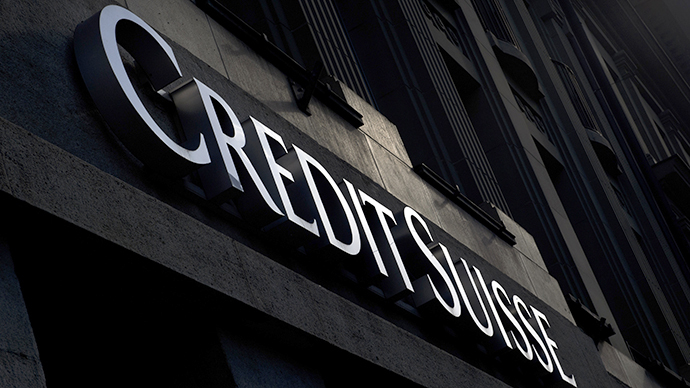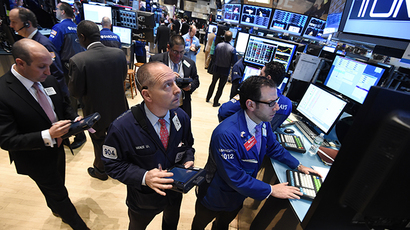Swiss bank admits to helping wealthy Americans avoid taxes, fined $2.6 bn

Swiss bank Credit Suisse pleaded guilty Monday to the charge that it facilitated wealthy Americans who sought to commit tax evasion, becoming the first major bank to admit criminal wrongdoing in over 20 years and agreeing to pay $2.6 billion in fines.
The settlement announcement Monday included an acknowledgement from bank officials that they knowingly and intentionally helped thousands of US citizens put their money into offshore accounts, allowing them to hide financial assets from the US Internal Revenue Service. US Attorney General Eric Holder, who has been criticized for being too slow to go after major banks, told reporters that the admission of guilt was a major step forward for prosecutors investigating financial institutions.
“This case shows that no financial institution, no matter its size or global reach, is above the law,” Holder said, as quoted by The New York Times. “Credit Suisse conspired to help US citizens hide assets in offshore accounts in order to evade paying taxes. When a bank engages in misconduct this brazen, it should expect the Justice Department will pursue criminal prosecution to the fullest extent possible, as has happened here.”
The penalty was handed down during a 45-minute hearing in New York City on Monday, forcing the bank - which has an American chief executive - to shell out the large sum and hire an independent monitor for two years.
The bank agreed to shell out a federal fine of $1.13 billion, $670 million to the IRS, another $715 million to the New York State Department of Financial Services, and $100 million to the Federal Reserve.
The deal was struck just months after a US Senate panel determined that Credit Suisse had specifically wooed more than 22,000 US customers with a net worth between $10 billion and $12 billion, with little - if any - of that money ever paid to the IRS.

Bankers traveled from Switzerland to recruit clients at US golf tournaments, according to the panel, and at one point a banker handed over financial documents hidden in a copy of 'Sports Illustrated' magazine.
“The bank went to elaborate lengths to shield itself, its employees, and the tax cheats it served from accountability for their criminal actions,” Holder went on. “They subverted disclosure requirements, destroyed bank records, and concealed transactions involving undeclared accounts by limiting withdrawal amounts and using offshore credit and debit cards to repatriate funds. They failed to take even the most basic steps to ensure compliance with tax laws.”
Before Credit Suisse agreed to plead guilty, six of the company's former bankers were indicted on charges that they helped wealthy Americans hide $4 billion in assets, one of which pleaded guilty. Holder said the settlement took months of planning, with the charges serious enough to close the bank down entirely.
“We deeply regret the past misconduct that led to this settlement,” Brady Dougan, the American CEO, said in a statement on Monday. “The US cross-border matter represented the most significant and longstanding regulatory litigation issue for Credit Suisse. Having this matter fully resolved is an important step forward for us.”
The pressure has increased for top officials who remain at the bank, as well, with well-known Swiss industry leaders calling for the Dougan’s resignation.
“In my opinion, the CEO as well as the chairman of the board must go in order to save the bank,” Christoph Blocher, a billionaire industrialist and influential politician, told Swiss newspaper Schweiz am Sonntag.
Pressure has amplified on several European banks in recent years. In 2009, UBS – the largest bank in Switzerland - entered into a deferred prosecution agreement with the US Justice Department. Under the terms of the deal, the bank agreed to hand over $780 million in fines and provide the names of the thousands of customers who were thought to be evading the IRS.
The next major bank to plead guilty is expected to be BNP Paribas, a massive French bank suspected of doing business with Sudan and Iran - countries that are blacklisted by the United States. Estimates on the size of the fine have ranged from $3 billion to north of $5 billion. The stiff penalties are an indication that the US Department of Justice is trying to shed its reputation of being soft on banking criminals, according to Samuel Buell, a former federal prosecutor who now teaches law at Duke University.
“The Justice Department is trying to play to two audiences at the same time: the public, which wants something that looks like real punishment, and the financial industry, which needs to be sent the sort of message that will deter these behaviors,” he told Bloomberg.














